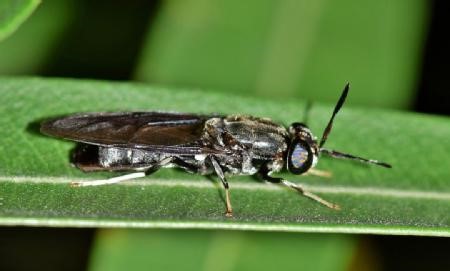WMG News - Latest news from WMG
Chitin can be successfully extracted from Black Soldier Fly husks
- Chitin comes from the husks of Black Soldier Fly Larvae, which are waste products of black soldier fly farming
- Black soldier fly farming is commonly done in parts of Africa and South East Asia, as they are used as a source of protein for livestock, therefore, to be able to use the husks could create a new economic opportunity
- The extraction process gives comparable quality material to other feedstocks, and extracts 50% of the available chitin in the husks researchers from WMG, University of Warwick have found
Chitin is a naturally occurring polymer from the husks of Black Soldier Fly larvae, usually considered a waste product from the farming of the Black Soldier Fly larvae. However, researchers from WMG at the University of Warwick decided to see if they could extract chitin from the husks, creating a new economic opportunity.
Black Soldier Fly larvae. However, researchers from WMG at the University of Warwick decided to see if they could extract chitin from the husks, creating a new economic opportunity.
Chitin is a sustainable source of protein in countries in South East Asia and south parts of Africa. When extracted it can be characterised and used in the biomedical industry, for example to make antiseptics and anticancer treatments.
In the report, ‘Purification of chitin from Black Soldier Fly larvae husks’, researchers from WMG at the University of Warwick have successfully extracted chitin from the husks of Black Fly Soldiers.
The extraction route developed in this work obtains around 50% of the total available chitin, which is comparable to existing processes.
Dr Stuart Coles, from WMG at the University of Warwick comments:
“We have found a new way of extracting chitin from the husks of Black Soldier Flies, which are commonly farmed in parts of Africa and South East Asia as they can be used as a source of protein for livestock.
“Chitin can be used to make antiseptics and anticancer treatments, so to be able to extract it from the husks which are a by-product of the farming process means that there’s potential to be more sustainable by using what would usually go to waste.”
The extraction process that the researchers developed at WMG used cheap and readily available materials to reduce the cost whilst still producing a high-quality material.
Dr Stuart Coles explains:
“The process involved the use of mild, readily available and inexpensive chemicals to breakdown the natural structure of the husk and allowed us to isolate the chitin. In isolating the chitin, we only used water as a solvent, and a large part of our work focused on reducing the amount of water being used as it is a critical resource in countries where Black Soldier Flies are farmed.”
Research can now continue to investigate how to commercialise the extraction process into a larger process.
ENDS
27 APRIL 2021
NOTES TO EDITORS
High-res images available at:
https://warwick.ac.uk/services/communications/medialibrary/images/april_2021/fly-1627592_1920.jpg
Caption: A Black Soldier Fly
Credit: Brett Hondow, Pixabay
For further information please contact:
Alice Scott
Media Relations Manager – Science
University of Warwick
Tel: +44 (0) 7920 531 221
E-mail: alice.j.scott@warwick.ac.uk
